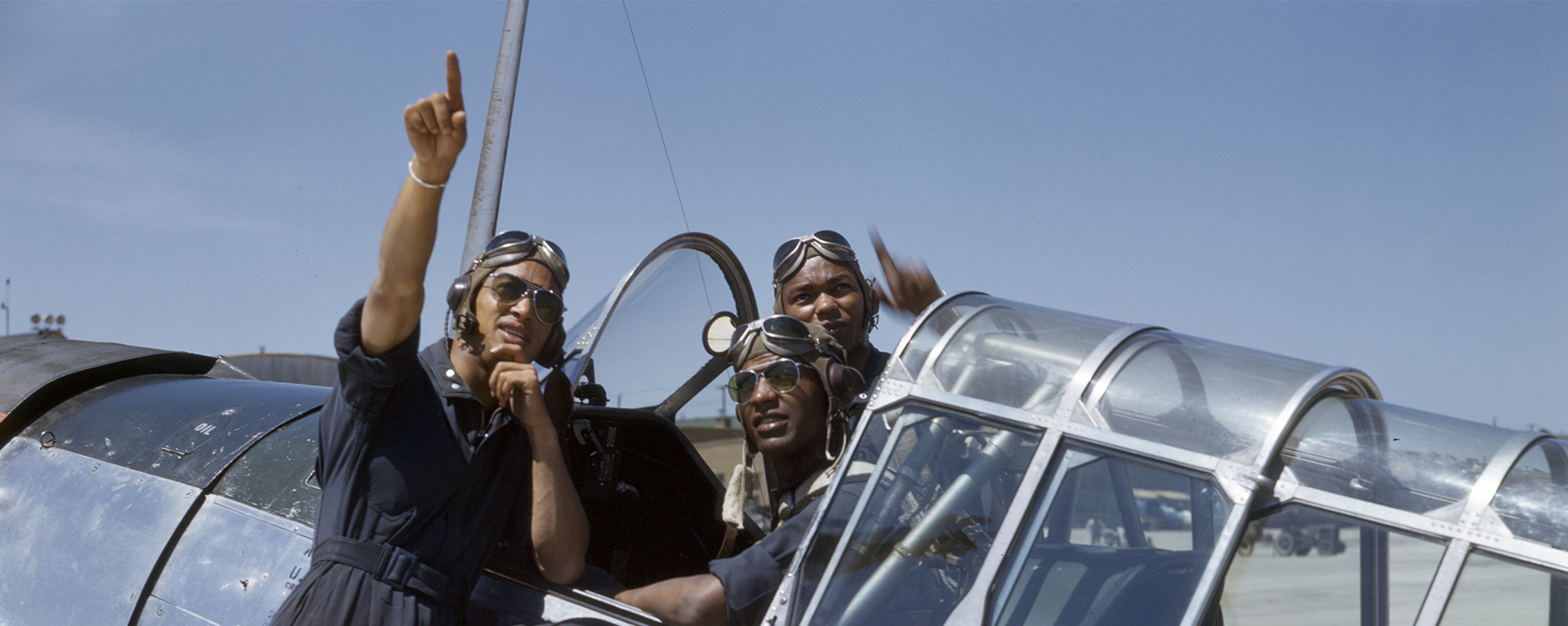Learn and Share the Tuskegee Airmen Story
Free Resources Now Available for Teachers, Students, and Everyone
As the first African-American pilots in the United States military, the Tuskegee Airmen are heroes of World War II and beyond. They served with distinction and fought to achieve a “double victory” against fascism overseas and racism at home.
When we learn their story, we become empowered. In honor of these American heroes, Lucasfilm has launched a new education page offering free resources for teachers, students, and anyone wishing to learn more.
Watch Double Victory: The Tuskegee Airmen at War
Double Victory (2012) is a Lucasfilm-produced feature-length documentary that tells the story of the Tuskegee Airmen from their training in America, combat in Africa and Europe, and return home to a country still impeded by segregation. It includes rare interviews with original Tuskegee Airmen.
Double Victory is freely available to watch on Lucasfilm’s official YouTube channel.
Download the New Educational Guide
As a companion to Double Victory: The Tuskegee Airmen at War, the guide is a learning tool for the virtual or physical classroom. Designed for students grades 6-12, it explores questions and themes immediate to the Tuskegee Airmen story, and introduces connections to our world today in order to foster a larger discussion between students and teachers.
The guide is written by Vivett Dukes, a teacher, writer, humanitarian, and social activist who holds a B.S. in English and Secondary Education and an M.A. in the Teaching of Writing and Literacy. Vivett is an advisor for the New York Times’ Upfront and Scholastic Action and Scope magazines, the Co-CEO/Co-Founder of SpeakYaTruth.org and One Voice Blog Magazine, and is on the Executive Board of the New York State English Council. She currently teaches ninth-grade English in Manhattan, New York.
Red Tails Landing in November
To celebrate Veterans Day and inspire continued learning about the Tuskegee Airmen, Lucasfilm is making the historical action-adventure Red Tails (2012) freely available on YouTube during the month of November 2020.
More About the Tuskegee Airmen
Trained in Alabama near the historic Tuskegee Institute, the group was a new program for the Army Air Forces, and Black cadets were recruited from across the United States. To some in the military hierarchy, African-Americans were considered inferior and unfit to fly in combat. This was a chance for Black pilots and their support crews to prove otherwise.
“We were very cocky,” veteran pilot Dr. Roscoe C. Brown, Jr. (1922-2016) later recalled on National Public Radio. “We came from a generation of African-Americans where we knew we had to be better than white people in order to even break through. Excellence was our mantra, and that’s what we were taught to be.”
The United States military was officially segregated, but within their units, the Black servicemen and women at Tuskegee performed all necessary roles and functions from nurses to mechanics to pilots. In 1941, First Lady Eleanor Roosevelt flew with the group during a visit to the Institute. Their commander Benjamin O. Davis, Jr., was a West Point graduate and son of the first African-American general in the United States Army.
Overseas, multiple units of Tuskegee Airmen were deployed to Africa and Europe where their fighter squadrons supported Allied bombing campaigns and engaged in tactical ground attacks. Their combat record was impressive, shooting down over 100 enemy aircraft, winning a host of medals and citations on some 1,500 missions. They overcame harsh scrutiny from some commanders to fly America’s best fighter aircraft, the P-51 Mustang, which they used to destroy some of the world’s first jet fighters deployed by the German Luftwaffe. The Tuskegee Airmen’s record for protecting Allied bombers was among the best in their unit.
Back in America, other Tuskegee Airmen in the 477th Bombardment Group were moved from base to base as racial tensions in surrounding communities plagued them. Over 100 Black officers refused to accept an unjust rule at Indiana’s Freeman Field that barred them from entering the base Officers’ Club because of their race. They were arrested, three were court-martialed, and one was convicted as a felon. Their records were officially cleared 50 years later.
After the war, the Tuskegee Airmen continued to fight pervasive racism. Many who wanted to fly commercially were unable. But their accomplishments in wartime helped to abolish segregation in the United States military in 1948, a move that established precedent for the wider civil rights movements to come. Before Martin Luther King, Jr., Rosa Parks, or Jackie Robinson, the actions of these pilots and crews (over 60 of whom were killed in action) remain seminal in American history and the struggle for equality of all citizens.

